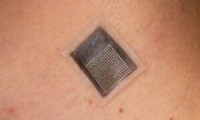-
Cell Phone Use Linked to Hypertension Risk?
- Source: drugdu
- 123
- May 12, 2023
-
Researchers use skull-implantable ultrasound to help deliver chemotherapy to the brain
- Source: drugdu
- 117
- May 7, 2023
-
Wearable ultrasound researchers report breakthrough in deep tissue monitoring
- Source: drugdu
- 136
- May 5, 2023
-
US cigarette smoking rate falls to historic low, but e-cigarette use keeps climbing
- Source: drugdu
- 125
- April 29, 2023
-
New machine-learning method predicts body clock timing to improve sleep and health decisions
- Source: drugdu
- 125
- April 26, 2023
-
Newly merged manufacturers Meridian, Kindeva invest $100M in Missouri site
- Source: drugdu
- 113
- April 13, 2023
-
A Future Without Screening Colonoscopies?
- Source: drugdu
- 121
- April 12, 2023
-
‘Overwhelming’ support for regulation of vape imports amid ‘health emergency’, TGA reports
- Source: drugdu
- 387
- March 30, 2023
-
Royal Papworth Hospital robot for thoracic surgery to be UK first
- Source: drugdu
- 126
- March 30, 2023
your submission has already been received.
OK
Subscribe
Please enter a valid Email address!
Submit
The most relevant industry news & insight will be sent to you every two weeks.











